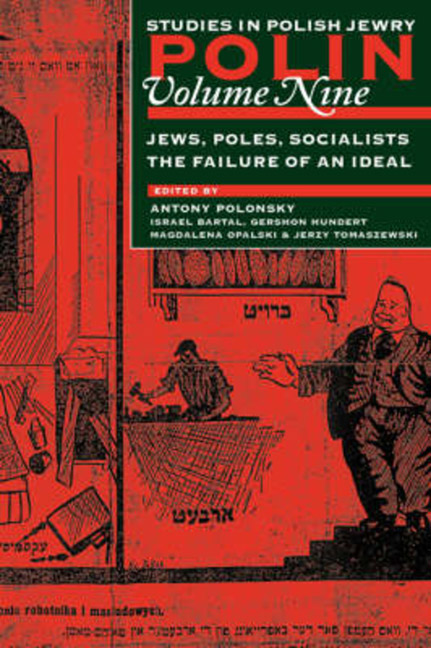Book contents
- Frontmatter
- Dedication
- Editors and Advisers
- Preface
- Acknowledgement
- Polin
- Polin: Studies in Polish Jewry
- Contents
- Note on Transliteration, Names, and Place Names
- Abbreviations
- Introduction
- PART I POLES, JEWS, SOCIALISTS: THE FAILURE OF AN IDEAL
- PART II NEW VIEWS
- PART III REVIEWS
- REVIEW ESSAYS
- BOOK REVIEWS
- Alfred Ebenbauer and Klaus Zatloukal (eds.), Die Juden in ihrer mittelalterlichen Umwelt
- Rivka Schatz-Uffenheimer, Hasidism as Mysticism
- Jadwiga Maurer, ‘Z matki obcej … ’
- Władyslaw T. Bartoszewski and Antony Polonsky (eds.), The Jews in Warsaw
- Maria Klańska, Problemfeld Galizien in deutschsprachiger Prosa 1846-191
- Israel Oppenheim, Tenuat Heḥaluts bePolin, 1929-1939
- The Letters of Martin Duber, ed. Nahum N. Glatzer and Paul Mendes-Flohr
- Alexander Heider, A Dictionary of Jewish Surnames from the Russian Empire
- Alice L. Eckardt (ed.), Burning Memory
- Ruta Sakowska, Ludzie z dzielnicy zamkniętej
- lwona Irwin-Zarecka, Neutralizing Memory
- Stanislaw Meducki and Zenon Wrona (eds.), Antyzydowskie wydarzenia kieleckie, 4 lipca 1946
- Bibliography Of Polish-Jewish Studies, 1993
- Notes on Contributors
- Notes on Translators
- Glossary
- Index
Władyslaw T. Bartoszewski and Antony Polonsky (eds.), The Jews in Warsaw
from BOOK REVIEWS
- Frontmatter
- Dedication
- Editors and Advisers
- Preface
- Acknowledgement
- Polin
- Polin: Studies in Polish Jewry
- Contents
- Note on Transliteration, Names, and Place Names
- Abbreviations
- Introduction
- PART I POLES, JEWS, SOCIALISTS: THE FAILURE OF AN IDEAL
- PART II NEW VIEWS
- PART III REVIEWS
- REVIEW ESSAYS
- BOOK REVIEWS
- Alfred Ebenbauer and Klaus Zatloukal (eds.), Die Juden in ihrer mittelalterlichen Umwelt
- Rivka Schatz-Uffenheimer, Hasidism as Mysticism
- Jadwiga Maurer, ‘Z matki obcej … ’
- Władyslaw T. Bartoszewski and Antony Polonsky (eds.), The Jews in Warsaw
- Maria Klańska, Problemfeld Galizien in deutschsprachiger Prosa 1846-191
- Israel Oppenheim, Tenuat Heḥaluts bePolin, 1929-1939
- The Letters of Martin Duber, ed. Nahum N. Glatzer and Paul Mendes-Flohr
- Alexander Heider, A Dictionary of Jewish Surnames from the Russian Empire
- Alice L. Eckardt (ed.), Burning Memory
- Ruta Sakowska, Ludzie z dzielnicy zamkniętej
- lwona Irwin-Zarecka, Neutralizing Memory
- Stanislaw Meducki and Zenon Wrona (eds.), Antyzydowskie wydarzenia kieleckie, 4 lipca 1946
- Bibliography Of Polish-Jewish Studies, 1993
- Notes on Contributors
- Notes on Translators
- Glossary
- Index
Summary
For Jews Warsaw after the Second World War constitutes something of a ghost town, with scarcely a thousand persons surviving the horrific events which transpired between 1939 and 1945. Warsaw, ‘the mother city of lsrael’, is, however, far from being a historical wasteland. This collection of essays bears witness to that once teeming life of Warsaw's Jewry, whose vicissitudes, as well as some of their remarkable achievements, are recorded in this volume.
Although most of the pieces have already been published in the present journal, this is not a random collection. A strict editorial hand has ensured that between them the previously published and the new essays leave virtually no chronological gap from the eighteenth to the twentieth century. If there are any remaining interstices, a fifty-page introduction by the editors fills them neatly with a lucid overview of the history of the Jews in Warsaw from the fifteenth through to the mid-twentieth century.
The essays vary in scope. Some authors pan over a broad historical period, e.g. Stefan Kieniewicz in his perceptive examination of how each of the partitioning powers from 1795 to 1861 impinged on Jewish life; others focus on micro-histories of particular events or institutions, e.g. Marian Marek Drozdowski in his description of events under King Stanisław August, or Artur Eisenbach in his study of Jews in Warsaw at the end of the eighteenth century. Some essays rely on published material, others, such as Krystyna Zienkowska's deft probe of the anti-Jewish riots of 1790, utilize archival material. To round off the narratives and analyses, there are two historiographical essays: Israel Gutman on Emanuel Ringelblum, an underground activist historian, and Robert Moses Shapiro on Jacob Shatzky, a historian of Warsaw Jewry.
This book will clearly be invaluable to all students of Judaica. Cultural historians will find particular interest in Alexander Guterman's chapter on the origins of the Great Synagogue, Kieniewicz's description of assimilated Jews in the nineteenth century, and Chone Shmeruk's suggestive sketch of Yiddish literary enterprises in Warsaw. From many of the essays one gains a sense of the great variety of Jews who lived in Warsaw: the Hasidim (who formed a majority by the late nineteenth century), the misnagdim, the maskilim, Litvaks, Polonized Jews, Germanized Jews, Russified Jews, Frankists, and other converts. Politically, Jews were just as heterogeneous, ranging from Zionists to Bundists, from Social Democrats to conservative bankers.
- Type
- Chapter
- Information
- Jews, Poles, Socialists: The Failure of an Ideal , pp. 280 - 282Publisher: Liverpool University PressPrint publication year: 2008



